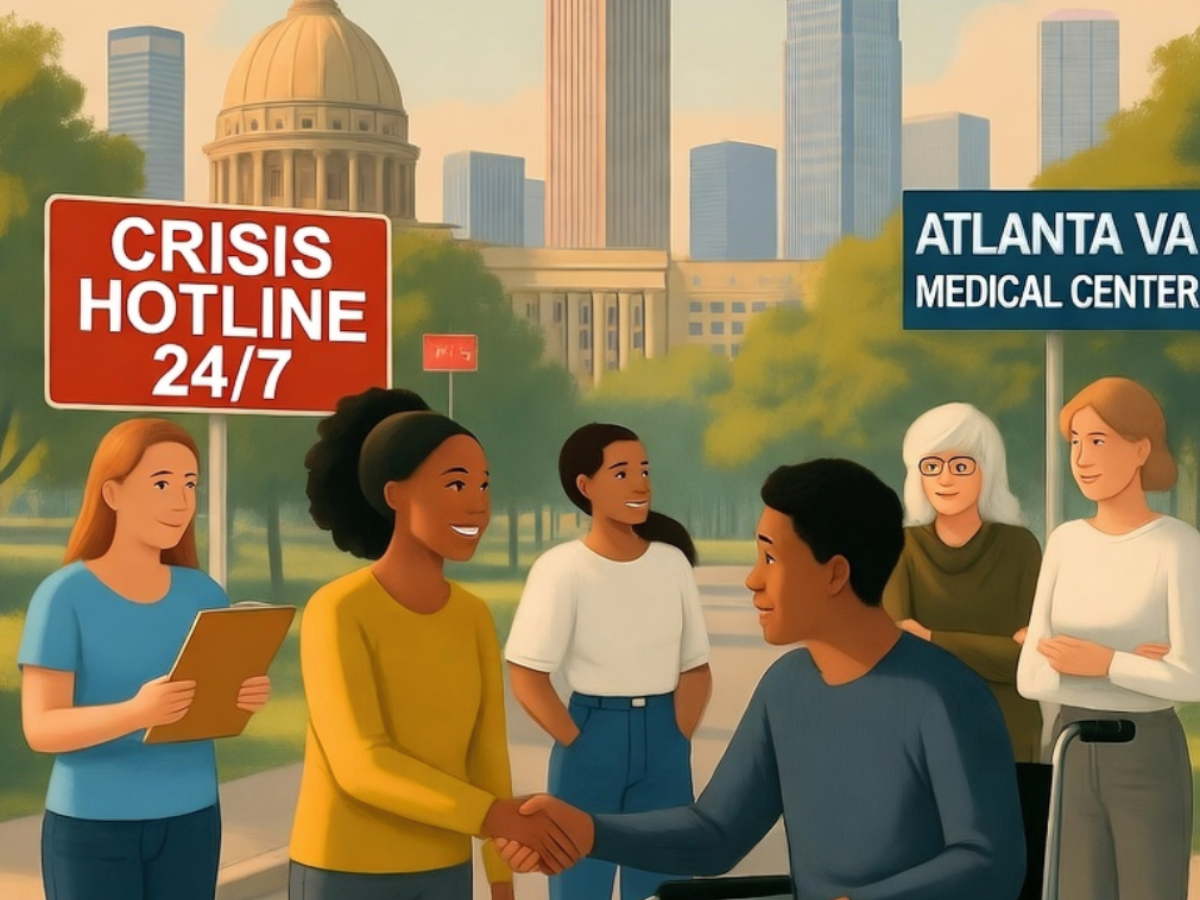In a city as vibrant and fast-paced as Atlanta, the pressures of daily life, work, and unexpected events can take a toll on mental well-being. Whether you’re dealing with anxiety, depression, or a crisis, help is available right here in the Peach State.
As Mental Health Awareness Month approaches its end and we head into the holiday season, local experts emphasize the importance of reaching out early.
Need Help With Your Mental Health? Check Out These Atlanta Resources
According to the Georgia Department of Behavioral Health and Developmental Disabilities, timely access to support can make all the difference in recovery.
To support our community, the Atlanta Beacon has compiled a list of five accessible mental health resources tailored for residents of Atlanta and Fulton County. These include crisis hotlines, community support groups, county services, hospital programs, and statewide providers with local reach. Remember, the National Suicide & Crisis Lifeline is always a free, confidential call away at 988, available 24/7.
1. Georgia Crisis & Access Line (GCAL)
For immediate crisis intervention, GCAL serves as Georgia’s frontline resource, connecting callers to counselors who can dispatch mobile crisis teams or link you to outpatient care, detoxification, and stabilization services.
aging.georgia.gov Available 24/7 for all ages across the state, including Atlanta, it’s ideal for urgent needs like suicidal thoughts or threats of harm. You can call on behalf of a loved one, and teams respond in homes for on-site assessments in 159 counties.
- Contact: 1-800-715-4225 (TTY: 1-800-255-0135) fultoncountyga.gov
- Website: dbhdd.georgia.gov/gcal
2. NAMI Northside Atlanta
The National Alliance on Mental Illness (NAMI) Northside Atlanta chapter offers free peer-led support groups, educational programs, and advocacy for individuals living with mental illness, their families, and caregivers.
naminorthsideatlanta.org Focused on reducing stigma through community discussions and resources, it’s a welcoming space for Atlantans seeking understanding and connection without judgment.
- Contact: 770-234-0855 (or NAMI Helpline: 1-800-950-NAMI, M-F 10 a.m.–10 p.m. ET) namiga.org
- Website: naminorthsideatlanta.org
3. Fulton County Behavioral Health and Developmental Disabilities Services
Fulton County’s adult mental health program provides no-cost or sliding-scale therapy, psychiatric assessments, group counseling, and crisis management for uninsured residents, veterans, and those with Medicaid or Medicare.
Services cover depression, anxiety, addiction, and co-occurring issues, with locations across Atlanta, North Fulton, and South Fulton. They also offer HIV early intervention counseling and testing as part of holistic care.
- Contact: 404-612-6520 (After-hours: GCAL at 1-800-715-4225)
- Locations: The Center for Health & Rehabilitation (265 Boulevard NE, Atlanta); North Fulton Service Center (7741 Roswell Road NE, Sandy Springs); South Fulton Service Center (5600 Stonewall Tell Road, College Park)
- Website: fultoncountyga.gov/services/behavioral-health
4. Grady Health System Behavioral Health Services
As Atlanta’s largest safety-net hospital, Grady offers integrated inpatient, outpatient, and emergency behavioral health care, treating conditions like bipolar disorder, depression, psychosis, and substance use disorders.
gradyhealth.org Their multidisciplinary teams provide everything from walk-in evaluations and therapy to community-based support and crisis response teams that co-respond to 911 calls. Special programs assist homeless individuals and those transitioning from hospitals.
- Contact: 404-616-4444 (Outpatient); 404-616-1000 (Hospital/Emergency)
- Locations: Behavioral Health Outpatient Center (10 Park Place SE, Atlanta); Grady Memorial Hospital (80 Jesse Hill Jr. Drive SE, Atlanta)
- Website: gradyhealth.org/services/behavioral-health
5. Georgia HOPE
This community-based provider delivers in-home and telehealth mental health counseling, substance use treatment, and family preservation services throughout Georgia, including Atlanta.
findhelp.org With a focus on accessible therapy that meets clients where they are—literally—Georgia HOPE emphasizes recovery and wellness through personalized plans.
- Contact: 706-279-0405
- Website: gahope.org
Bonus: For Veterans
Veterans face unique challenges, including PTSD, depression, anxiety, and the transition to civilian life. The good news is that a range of free or low-cost services are available nationwide through the U.S. Department of Veterans Affairs (VA) and partner organizations.
These resources offer everything from crisis intervention to ongoing therapy, peer support, and educational tools. If you’re in immediate crisis, dial 988 and press 1 for the Veterans Crisis Line—confidential support available 24/7 via phone, chat, or text (838255).
The VA provides comprehensive care, including outpatient counseling, inpatient treatment, medication management, and telehealth options for conditions like PTSD, depression, and substance use disorders. Services are available at over 1,300 VA facilities or virtually, with no copays for many preventive mental health visits.
- Contact: Call your local VA medical center or 1-877-222-8387 (VA Health Benefits Toll-Free).
- Website: va.gov/health-care/health-needs-conditions/mental-health
Final Word
Seeking help is a sign of strength, not weakness. If you’re unsure where to start, a quick call to GCAL or 988 can guide you to the right fit. Atlanta’s mental health community is here to support you—because a healthier mind builds a stronger city.
For more local resources, visit the Georgia Department of Human Services’ mental health page.





